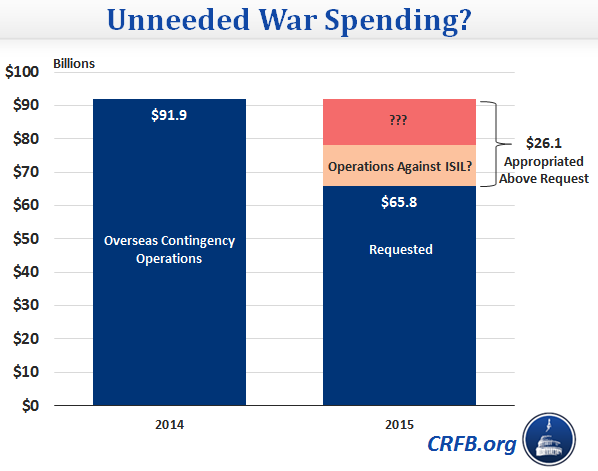War Spending Shouldn't Become a Slush Fund
The resolution setting next year's budget continues this year's levels of war spending, despite the fact that the federal government was supposed to spend much less after reducing troop levels in Afghanistan. It contains war spending at an annualized level $26 billion higher than requested by the President. Even if some funds are spent on operations against the Islamic State terrorist group, billions are still being appropriated above what is needed for overseas operations without a clear purpose.
Broadly, the continuing resolution extends last year's spending level of $1.012 trillion for regular discretionary spending. (See our blog House Resolution Continues Last Year’s Spending, Mostly for the exceptions). In addition, Congress designates an amount for Overseas Contingency Operations (OCO) not restricted by the same discretionary spending caps. The resolution continues OCO funding at the FY 2014 level of $92 billion, $26 billion higher on an annual basis than the Administration's $66 billion request.
Since the resolution only covers two-and-a-half months, continuing spending at the FY14 rate would provide about $5 billion more than requested for the length of the CR. The decision to continue funding for OCO at the last year's levels could be even more significant if Congress continues this policy when revisiting a long-term CR or omnibus bill after this CR expires in December.
Even if operations against the Islamic State terrorist group end up as a prolonged campaign costing $10 to $15 billion, as some estimates suggest, there will still be billions of "extra" OCO funding. This money's purpose is unclear. It could serve as an advance appropriation for military operations so the President does not need to return to Congress for additional funding. However, it is also possible those excess funds would be used to to skirt budget caps and "backfill" the regular DoD budget.
Funding OCO at levels well above the administration's request without a clear justification is particularly troubling because these funds are not subject to budget discipline. In a statement, CRFB President Maya MacGuineas warned:
[W]e are concerned that much of this additional funding will be used to backfill the base defense budget and effectively circumvent the caps on defense spending. Because spending for OCO is effectively exempt from budget discipline, it is particularly important that spending through OCO be scrutinized and limited to the intended purposes.
There is already evidence that the Pentagon is using the higher OCO budget to pay for other programs, as they have requested to spend $500 million of the unobligated portion to fund Ebola aid for West Africa. However noble the purpose, this shift begins a dangerous trend of circumvention. These excess funds could too easily become a slush fund to avoid budget caps by funding items unrelated to overseas operations.
When Congress considers further appropriations in December, Congress should provide a OCO funding level that reflects actual needs rather than continuing funding at current levels. It should also enact strict criteria for OCO funds to limit their use on activities unrelated to ongoing overseas operations. Exploiting the OCO designation to circumvent budget discipline will worsen the debt's already unsustainable trend.



